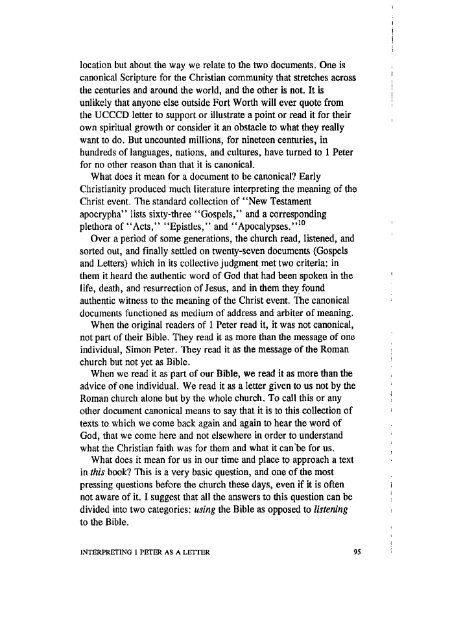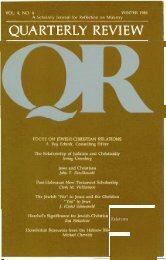TJieodore W. Jennings, Jr. The Meaning of ... - Quarterly Review
TJieodore W. Jennings, Jr. The Meaning of ... - Quarterly Review
TJieodore W. Jennings, Jr. The Meaning of ... - Quarterly Review
Create successful ePaper yourself
Turn your PDF publications into a flip-book with our unique Google optimized e-Paper software.
location but about the way we relate to the two documents. One is<br />
canonical Scripture for the Christian community that stretches across<br />
the centuries and around the world, and the other is not. It is<br />
unlikely that anyone else outside Fort Worth will ever quote from<br />
the UCCCD letter to support or illustrate a point or read it for their<br />
own spiritual growth or consider it an obstacle to what they really<br />
want to do. But uncounted millions, for nineteen centuries, in<br />
hundreds <strong>of</strong> languages, nations, and cultures, have turned to 1 Peter<br />
for no other reason than that it is canonical.<br />
What does it mean for a document to be canonical? Early<br />
Christianity produced much literature interpreting the meaning <strong>of</strong> the<br />
Christ event. <strong>The</strong> standard collection <strong>of</strong> "New Testament<br />
apocrypha" lists sixty-three "Gospels," and a corresponding<br />
plethora <strong>of</strong> "Acts," "Epistles," and "Apocalypses." 10<br />
Over a period <strong>of</strong> some generations, the church read, listened, and<br />
sorted out, and finally settled on twenty-seven documents (Gospels<br />
and Letters) which in its collective judgment met two criteria: in<br />
them it heard the authentic word <strong>of</strong> God that had been spoken in the<br />
life, death, and resurrection <strong>of</strong> Jesus, and in them they found<br />
authentic witness to the meaning <strong>of</strong> the Christ event. <strong>The</strong> canonical<br />
documents functioned as medium <strong>of</strong> address and arbiter <strong>of</strong> meaning.<br />
When the original readers <strong>of</strong> 1 Peter read it, it was not canonical,<br />
not part <strong>of</strong> their Bible. <strong>The</strong>y read it as more than the message <strong>of</strong> one<br />
individual, Simon Peter. <strong>The</strong>y read it as the message <strong>of</strong> the Roman<br />
church but not yet as Bible.<br />
When we read it as part <strong>of</strong> our Bible, we read it as more than the<br />
advice <strong>of</strong> one individual. We read it as a letter given to us not by the<br />
Roman church alone but by the whole church. To call this or any<br />
other document canonical means to say that it is to this collection <strong>of</strong><br />
texts to which we come back again and again to hear the word <strong>of</strong><br />
God, that we come here and not elsewhere in order to understand<br />
what the Christian faith was for them and what it can be for us.<br />
What does it mean for us in our time and place to approach a text<br />
in this book? This is a very basic question, and one <strong>of</strong> the most<br />
pressing questions before the church these days, even if it is <strong>of</strong>ten<br />
not aware <strong>of</strong> it. I suggest that all the answers to this question can be<br />
divided into two categories: using the Bible as opposed to listening<br />
to the Bible.<br />
INTERPRETING 1 PETER AS A LETTER 95












